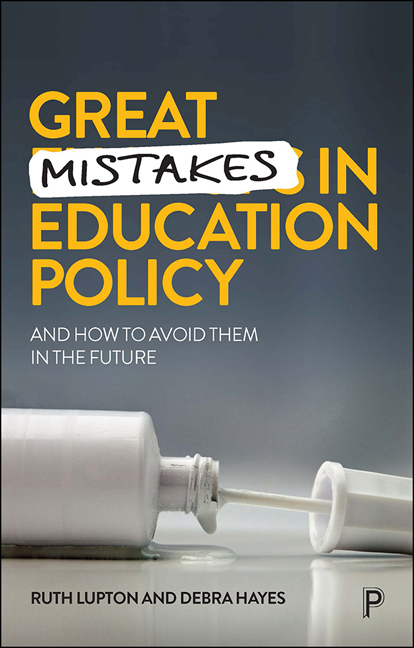Book contents
- Frontmatter
- Contents
- List of tables and boxes
- List of abbreviations
- Notes on the authors
- Acknowledgements
- 1 Introduction
- 2 Setting the scene
- 3 Tests, tests, tests
- 4 Schooling that works for some but not for others
- 5 Teachers making less of a difference
- 6 Mistake #1: turning to the market
- 7 Mistake #2: letting test scores drive policy
- 8 Mistake #3: over-prescribing teachers’ work
- 9 Mistake #4: misunderstanding educational inequalities
- 10 Mistake #5: leaving education out of education policy making
- 11 Synthetic phonics: a ‘perfect storm’ of policy mistakes
- 12 There are alternatives
- References
- Index
3 - Tests, tests, tests
Published online by Cambridge University Press: 23 December 2021
- Frontmatter
- Contents
- List of tables and boxes
- List of abbreviations
- Notes on the authors
- Acknowledgements
- 1 Introduction
- 2 Setting the scene
- 3 Tests, tests, tests
- 4 Schooling that works for some but not for others
- 5 Teachers making less of a difference
- 6 Mistake #1: turning to the market
- 7 Mistake #2: letting test scores drive policy
- 8 Mistake #3: over-prescribing teachers’ work
- 9 Mistake #4: misunderstanding educational inequalities
- 10 Mistake #5: leaving education out of education policy making
- 11 Synthetic phonics: a ‘perfect storm’ of policy mistakes
- 12 There are alternatives
- References
- Index
Summary
This chapter is the first of three in which we set out the problems manifest in our current schooling systems. We put the biggest problem first – schools are becoming dominated by tests, in ways that are detrimental to children and young people and limit education rather than improving it.
In England, children do external tests from their first year of schooling. They take a phonics check in Year 1, Standard Assessment Tests (SATs) for English and maths at the end of Year 2 and again in Year 6, the General Certificate of Secondary Education (GCSE) or equivalent examinations at the end of Year 11, and Advanced (‘A’) Levels or equivalent at the end of Year 13. There are also standard teacher assessments at the end of the Foundation Stage (age about five).
In Australia, assessment regimes vary across state jurisdictions. However, in the earlier grades (3, 5, 7, and 9) ACARA conducts national assessments in literacy and numeracy through NAPLAN. The Year 12 end-of-school record of achievement is determined by each jurisdiction and may include a range of academic and vocational subjects assessed through a variety of means including examinations, performance tasks and portfolios. On completion of schooling, eligible students may also receive an Australian Tertiary Admission Rank (ATAR), which ranks them relative to others in their state or territory for university admission purposes.
The ways in which these assessment regimes shape the practice of teachers’ and children's experiences of school has been the subject of numerous academic studies, enquiries and reviews by parliamentary committees, independent review bodies, teacher unions and others. They come to the same conclusions. Tests have many valid and valuable purposes but the situation is out of balance. Tests are dominating school life and creating a narrower curriculum, shallower learning, and more anxiety and unhappiness. They tend to exacerbate inequalities rather than reduce them. And, worryingly, in relation to the challenges outlined in Chapter 2, they tend to have the most pronounced effects in less advantaged schools and communities.
Narrower and shallower
In 2017, England's Chief Inspector of Schools (Head of Ofsted), Amanda Spielman, used a major speech to remind the educational establishment not to lose sight of the “substance of education” – in her words “broadening minds, enriching communities and advancing civilisation” (Spielman, 2017) – through over-focusing on tests.
- Type
- Chapter
- Information
- Great Mistakes in Education PolicyAnd How to Avoid Them in the Future, pp. 27 - 40Publisher: Bristol University PressPrint publication year: 2021

